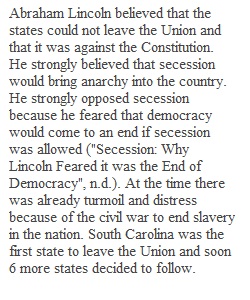


Q This discussion addresses the following outcomes: • Explain the military and social reasons for the North’s victory and the South’s loss in the Civil War (CO#3, CO#5) • Examine and describe the Lower South states’ arguments for seceding from the Union after the election of 1860 and the initial reaction to secession by the Union and President Lincoln (CO#4, CO#5) • Chronicle and explain the shift in Union war aims in 1861 and 1862 from suppressing rebellion to ending slavery. (CO#5) The Lower South states repudiated the election of 1860 by seceding. In doing so they explained their actions in published ordinances and declarations. Over early 1861, the last few attempts at compromise worked their way through Congress, ultimately failing to stave off the inevitable conflict. Likewise, President Abraham Lincoln attempted during his inaugural address to downplay the controversy as a way of providing room for reconciliation. Once war began, both sides had to reconsider their initial plans and adjust their tactics. The war was not yet a total war in terms of goals or methods (such as economic and popular mobilization) but was fast becoming so. By the end of 1862, the Civil War had transformed from a quick war to secure independence or to suppress a rebellion (depending on whether you were in the United States or the Confederacy) into a four year conflict that killed more than 600,000 people (2% of the total population). Despite the Confederacy’s military efforts, by the end of 1863 Union forces had gained the upper hand. In this discussion you will consider the arguments for and against secession and the reason for the Confederacy’s loss and the Union’s victory. Both sides brought with them advantages and disadvantages which they respectively sought to exploit or to minimize. Ultimately, though, the United States prevailed. In preparation for our discussion be sure to read the Modules Notes, Chapter 14: “The Civil War (Links to an external site.)” in The American Yawp, and view Most Hallowed Ground (Links to an external site.). Please also read the following primary sources: South Carolina’s Declaration of the Immediate Causes (Links to an external site.) (1860), and First Inaugural Address of Abraham Lincoln (Links to an external site.) (1861). Choose either the South or the North to focus on in depth in this discussion, using the sources listed above. Then, examine one the following in a post of at least 250 words: • The South: What arguments did Southern states make in favor of secession? What were the Confederacy’s military and societal strengths and weaknesses? What were the most important factors, in the end, in explaining why the Confederacy lost? OR • The North: What arguments did Union leaders like President Lincoln make regarding secession and slavery in 1861 and how did those arguments change over the course of the war? What were the Union’s military and societal strengths and weaknesses? What were the most important factors, in the end, in explaining why the Union won? Then, over the course of the week, respond to the posts of at least two of your classmates, including at least one classmate who chose the opposite topic from you.
View Related Questions